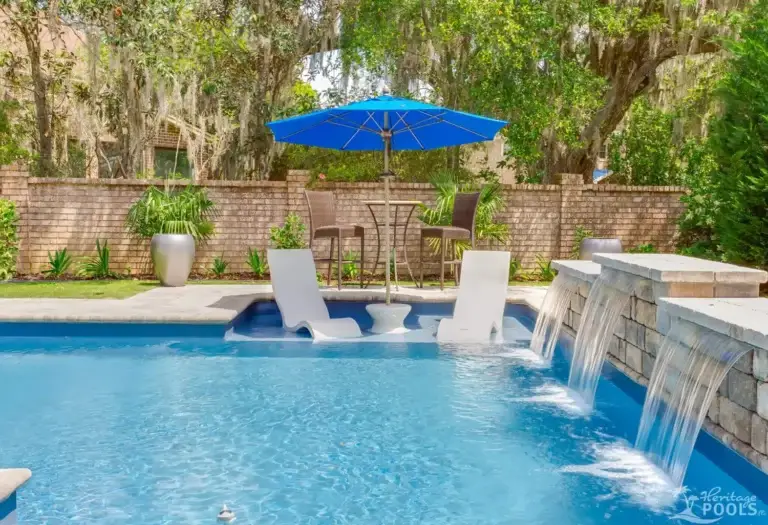So, you shocked your pool as part of your standard maintenance routine and the water turns into a cloudy pool, instead of the typical crystal clear?
It’s not uncommon.
What can happen after adding your pool chemicals or liquid chlorine is a chain reaction due to other factors, like the five causes we will cover in this blog post.

Pool Cloudy After Shock? 6 Contributors to Cloudy Pool Water
Let’s see all the contributors that can lead to cloudy swimming pool water after pool shock.
1. High pH Levels
Your pool being cloudy after shock could possibly result from high pH levels, which are a significant component of pool water chemistry. pH and total alkalinity balances are crucial. Low pH means the water is acidic, and a higher pH implies it is mainly alkaline.
Elevated pH levels may cause calcium buildup and scaling within the pools, along with decreased chlorine effectiveness and consequent clouded water quality. It could be that your pool’s pH and Total Acidity are in imbalance after an accident.

2. High Calcium Hardness Level
Calcium hardness that is too high can cause cloudy pool water. This happens when the levels of calcium in the pool water are above optimal, making it difficult for chlorine to remain dissolved and in turn, making it harder to sanitize the pool.
Using liquid chlorine can help manage calcium hardness levels and prevent cloudy water.
High calcium hardness can also create scale on the walls and floor of a pool which will make the water look cloudy or hazy. Some shocks impact the calcium hardness level.

3. High Cyanuric Acid Levels
Cyanuric Acid, also known as CYA, stabilizer, or conditioner, is an excellent chemical for swimming pools. Cyanuric acid provides sun protection for chlorus by preventing its dissolution by UV radiation. However, high CYA levels can cause cloudy pool water after the pool shock.
Chloramine shock is produced by using stable chlor and contains cyanuric acid.

4. Pool Water Clarifier
A good pool clarifier will allow all the small particles that can create a cloudy pool to bind together into larger particles that the pool filter can take care of. Adding a pool clarifier is a good idea after shocking your pool.
See your local pool store for options.

5. Pool Filter/Pool Pump Problems
Your filtration system can contribute to cloudy water after shocking by not properly circulating or filtering the water.
A cloudy pool is a sign your pool filter has accumulated too much dirt and debris and is clogged up.
See your manufacturer’s instructions for cleaning your pool filter or call Heritage Pools for professional support.

6. Contaminants in the Pool
Contaminants in the pool can cause cloudy water, even after shocking. These contaminants can come from various sources, including:
- Debris and dirt from the surrounding area
- Body oils and sweat from swimmers
- Insecticides and pesticides from nearby gardens
- Fertilizers and chemicals from nearby lawns
To keep your pool water crystal clear, it’s essential to tackle these contaminants head-on. Start by regularly skimming the surface of the water to remove floating debris. This simple step can prevent a lot of dirt from settling at the bottom of your pool. Additionally, vacuuming the pool floor and walls will help remove any dirt and sediment that has already settled.
Using a pool clarifier can also be a game-changer. A good pool clarifier will bind small particles together, making them easier for your pool filter to catch and remove. This can significantly improve the clarity of your pool water.
Regularly shocking your pool is another crucial step. Pool shocks help oxidize and remove contaminants, ensuring your water stays clean and clear. However, some contaminants, like algae, can be particularly stubborn and may require specialized treatments. If you notice persistent cloudiness despite your best efforts, it might be time to consult your local pool store for professional advice and solutions.
By staying vigilant and proactive, you can keep your pool water sparkling clean and inviting all season long.
Frequently Asked Questions
What is calcium hypochlorite used for in pools?
Calcium Hypochlorite is commonly used to treat swimming pools. When added to water, it breaks down into active chlorine that works to disinfect and kill germs, bacteria, and other harmful microorganisms.
Calcium hypochlorite can also be used to help reduce the pH level of swimming pools as well as increase their clarity.
By providing a proper level of sanitation and maintaining healthy pool water chemistry, calcium hypochlorite is an essential tool for safe and enjoyable swimming experiences.
Is chlorine and pool shock the same thing?
Yes. However, pool shock is a high dose of chlorine.
Conclusion – Get Clear Cloudy Pool Water With Professional Help
Your pool’s health is of utmost importance to the factory-trained technicians at Heritage Pools. We have more than a decade of experience with water chemistry and clearing cloudy swimming pool water for your in-ground pool in the Charleston area.
If you have an above-ground pool, please call our Maintenance Department to determine if service is possible.
Make sure pool season continues all year round with professional pool maintenance from Heritage Pools.





